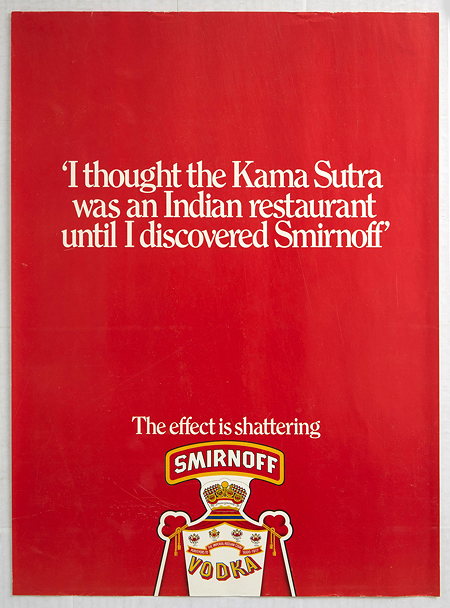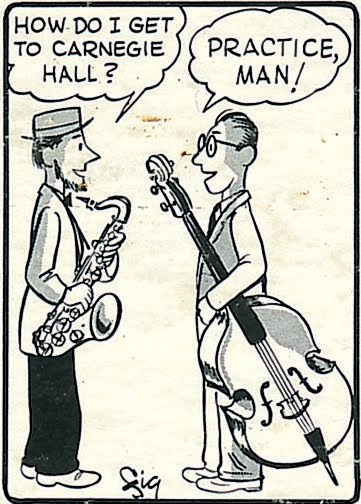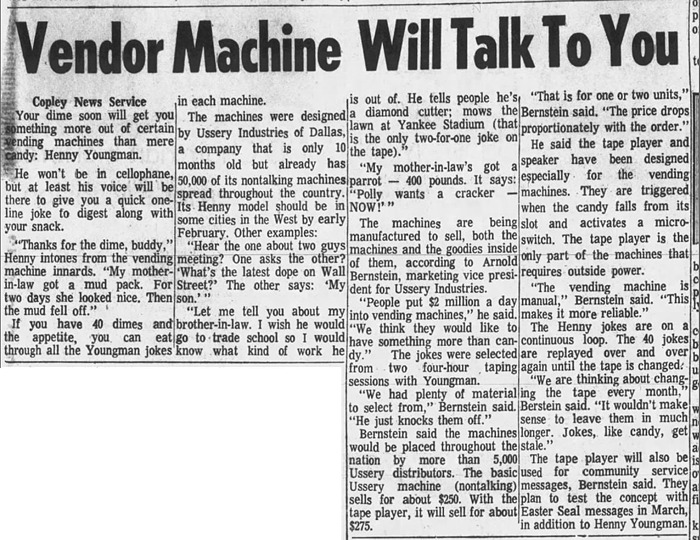Jokes
Levitating Necktie
Any gimmick with a string leading into one's pants is a winner!Full patent here.


Posted By: Paul - Mon Jan 27, 2025 -
Comments (0)
Category: Fashion, Inventions, Patents, 1940s, Jokes, Pranks
“I thought the Kama Sutra was an Indian restaurant”
Smirnoff ran this ad in the 70s but reportedly pulled it after a few months when its market researchers surveyed customers and discovered that "60 per cent of them thought that the Kama Sutra was indeed an Indian restaurant."
image source: codex
But according to Delia Chiaro in The Language of Jokes, the ad lived on in popular memory, inspiring a genre of "Smirnoff jokes".
I thought innuendo was an Italian suppository until I discovered Smirnoff.
I thought cirrhosis was a type of cloud until I discovered Smirnoff.
However it was not long before the graffitists began to abandon the formula, first by substituting the word Smirnoff with other items:
I thought Nausea was a novel by Jean-Paul Sartre until I discovered Scrumpy.
Soon, the caption began to move more radically away from the matrix, as more items were changed. In the next example there is no allusion to drink whatsoever:
I used to think I was an atheist until I discovered I was God.
Although Smirnoff jokes are now practically obsolete, the I thought A was B until I discovered C formula has now frozen into the English language as a semi-idiom. Today we can find graffiti (or indeed hear asides) such as:
I used to talk in cliches but now I avoid them like the plague
in which the original matrix is barely recognizable.
Below is another Smirnoff ad from the same series.

Posted By: Alex - Wed Aug 11, 2021 -
Comments (5)
Category: Inebriation and Intoxicants, Advertising, 1970s, Jokes
A real stickup
April 1981: Dad humor gone too far? Ciro Jose Leon entered a store holding a three-foot stick, slammed it down on the counter, and declared this was a stickup. Bystanders intervened and held him until the police arrived. Leon was booked for investigation of armed robbery.
Santa Clarita Signal - Apr 17, 1981
Posted By: Alex - Tue Nov 10, 2020 -
Comments (0)
Category: Crime, Jokes
The jokes of Immanuel Kant
We've posted before about jokes from unlikely sources, such as the jokes of Lord Aberdeen, and the jokes of King George VI. Now, along similar lines, comes a book from Robert Clewis — Kant's Humorous Writings . It's a collection of 30 jokes told by the German philosopher Immanuel Kant.
Kant and humor are, I'm guessing, two things most people wouldn't associate together. And after reading Clewis's book, their opinion on this subject may not change.
Clewis freely admits this. In his preface he notes that he was "once tempted to call the book Kant’s Humorous Writings: I Wish They Existed." He goes on to say, "Readers may find the jokes to be boring or even offensive. No promise is being made that the reader will find the jokes amusing."
But Clewis also insists that the book itself isn't a joke. Nor was his intent to lampoon Kant. As he describes it, while studying Kant he realized that the philosopher's work included occasional jokes. His curiosity aroused, he thought it would be interesting to collect these jokes together, as a way of understanding what Kant thought was amusing.
Each joke is accompanied by an illustration drawn by artist Nicholas Ilic. So it's very much a book geared for a general audience. (Admittedly, an audience who appreciates offbeat, erudite material). Personally I think it seems like a great coffee table book. But then, I'm strange that way.
I've reproduced two of Kant's jokes, as well as Clewis's explanation of them, below.
Amazon link
There was once a young merchant who was sailing on his ship from India to Europe. He had his entire fortune on board. Due to a terrible storm, he was forced to throw all of his merchandise overboard. He was so upset that, that very night, his wig turned gray.
Explanation:
This joke comes from the Critique of the Power of Judgment (1790), one of Kant's three Critiques. He contrasts this version with another version: the merchant's hair turns gray. But in that version, we listeners or readers become more concerned and involved. We empathize with the merchant and feel his pain more than in the first version. When it's just a wig, we are in a better position to find the story amusing. We hear the narrative as a joke rather than as descriptive speech, a real story about the world that can be either true or false.
Kant thinks that when we hear or read a joke as a joke, we need to be removed from the situation or story; we cannot have something at stake in it. He calls this disinterestedness, which turns out to be a key principle in his aesthetic theory and account of beauty. "Taste is the faculty for judging an object or a kind of representation through a satisfaction or dissatisfaction without any interest. The object of such a satisfaction is called beautiful." While the humorous is not the same as the beautiful, Kant thinks that our response to both of them requires a kind of disinterestedness. A notion of disinterestedness can be found in the writings of Shaftesbury (Anthony Ashley Cooper) (1651–1713) and other eighteenth-century aesthetic theorists. Today the notion of disinterestedness remains controversial. Some theorists think that the idea can be better captured by the concept of absorbed attention or focus.

Immanuel Kant
A man's rich relative dies. Suddenly he is rich. To honor his relative, the man wants to arrange a solemn funeral service. But he keeps complaining that he can't get it quite right.
"What's the problem?" someone asks.
"I hired these mourners, but the more money I give them to look grieved, the happier they look."
Explanation:
This is a second joke from the Critique of the Power of Judgment. Kant is using it to illustrate his incongruity theory of humor. When we learn that the mourners are happy because they are getting paid, he says, our expectation is suddenly "transformed into nothing."
The philosophical underpinning is that there are at least two levels of satisfaction at work: we feel sadness, joy, etc. (first-order satisfaction) and then can approve or disapprove of it using reason (second-order). A man can be glad that he is receiving an inheritance from a deceased relative, yet disapprove of his gladness. "The object can be pleasant, but the enjoyment of it displeasing."
The joke turns on something similar happening with the mourners. They are so happy that they are getting paid (second-order) that they are no longer able to look sad (first-order).
There is a similar anecdote in Plato's Ion, a dialogue about a professional reciter (a "rhapsode") named Ion, who aimed at moving his audience. Ion says that when he looks out at the audience and sees them weeping, he knows he will laugh because it has made him richer, and that when they laugh, he will be weeping about losing the money.
Posted By: Alex - Mon Sep 28, 2020 -
Comments (2)
Category: Humor, Jokes, Philosophy, Books
Jokes Cracked By Lord Aberdeen
Lord Aberdeen (1847-1934) was Lord Lieutenant of Ireland in 1886, and again from 1905 to 1915. He held the office of Governor General of Canada from 1893 to 1898. He also fancied himself something of a wit and allowed some of his jokes to be collected together in a volume titled Jokes Cracked by Lord Aberdeen, published in 1929 by Valentine Press.Over the years, the book became a cult classic, due to its reputation as the worst joke book ever published. On the strength of this reputation, it was republished in 2013 (available on Kindle for $1.99).
In reality, the jokes aren't all that bad. However, they are liberally sprinkled with Scottish dialect, which can make them hard to understand. Also, their subject matter is often quite dated.
But judge them for yourself. I've collected together some examples below.

You probably failed to get that joke. I certainly had no clue what the punchline meant. Here's an explanation by John Finnemore (who wrote the intro to the 2013 edition):
More jokes (easier to understand):
'Well, but,' replied the bishop, 'I don't know your aunt.'
The wife seemed rather dubious, but replied, "Well, I suppose he micht try."
"All right" said the doctor, "I had better call again in a few days to see how he does."
And sure enough, in due course, the doctor arrived and on asking the wife how the new diet was suiting her husband, received the following reply:
"Weel, he manages middlin' well wi' the neeps; and whiles the linseed cake, but oh! doctor, he canna thole the strae!"
('he canna thole the strae' = he cannot stand the straw)
In this way an element of permanence is secured for the assistant or colleague, since, humanly speaking, it is only a matter of time when he will have full charge, and the full stipend, such as it may be.
I remember that the late Dr. Marshall Lang, who was a Moderator of the Church of Scotland, and latterly Principal of the University of Aberdeen, when speaking on a subject which included the above arrangement, said that he had heard of an elderly minister who once said to his "assistant and successor:" "I suppose, my young friend, you are 'thinking long' for my dying?"
"Ah, no, sir," replied the younger man, "you must not put it so; for it is your living that I desire."
Sandy: "I noticed that, when I was takin' up the collection."
More in extended >>
Posted By: Alex - Wed Aug 12, 2020 -
Comments (2)
Category: Books, Jokes
How do you get to Carnegie Hall?
Carnegie Hall has a page about this famous joke:Carnegie Hall archivist Gino Francesconi says that the best version he’s heard involved violinist Mischa Elman. As the story goes, Elman was walking from Carnegie Hall toward his hotel following a rehearsal. He wasn’t happy with his playing and had his head down. Two tourists who saw his violin case asked him the question. Without looking up, he replied, “Practice.”
“He was impish enough and known for his sense of humor to come up with it,” says Francesconi.
They also sent a camera team out to ask New Yorkers how to get to Carnegie Hall:

source: Luis Dias
Posted By: Alex - Tue Apr 14, 2020 -
Comments (1)
Category: Jokes
Vend-a-Joke
In 1971, Ussery Industries debuted a vending machine that for 10 cents would play a joke by Henny Youngman as well as dispense a candy bar.Sample jokes: "My mother-in-law got a mud pack. For two days she looked nice. Then the mud fell off."
"Let me tell you about my brother-in-law. I wish he would go to trade school so I would know what kind of work he is out of. He tells people he's a diamond cutter; mows the lawn at Yankee Stadium."
The vend-a-joke machine apparently didn't do very well. But two years later Youngman was featured on one of the first dial-a-joke lines in New York City, and that did much better.

The Odessa American - Jan 28, 1971
Posted By: Alex - Thu Jun 28, 2018 -
Comments (3)
Category: 1970s, Jokes
Chicken Croquet
Coolest. Games. Ever. from Athena G on Vimeo.
I'm willing to bet that this is one of a very limited number of toys whose genesis can be traced directly to someone making a bad pun.
Posted By: Paul - Thu Jul 07, 2016 -
Comments (1)
Category: Animals, Toys, 1990s, Jokes
Wrong Car

Similar to Alex's post of a day or two ago! How often does this kind of thing happen?
Original article here.
Posted By: Paul - Wed Feb 10, 2016 -
Comments (10)
Category: Jokes, Africa
Send A Tasteful Gift

Great new gift to send to special friends, Dick in a Box. Its a phallus shaped candy, and there are choices so you can pick your dick to send. NSFW at link and in comments section.
More in extended >>
Posted By: Alex - Thu Jan 14, 2016 -
Comments (12)
Category: Jokes, Pranks, Genitals

| Who We Are |
|---|
| Alex Boese Alex is the creator and curator of the Museum of Hoaxes. He's also the author of various weird, non-fiction, science-themed books such as Elephants on Acid and Psychedelic Apes. Paul Di Filippo Paul has been paid to put weird ideas into fictional form for over thirty years, in his career as a noted science fiction writer. He has recently begun blogging on many curious topics with three fellow writers at The Inferior 4+1. Contact Us |




